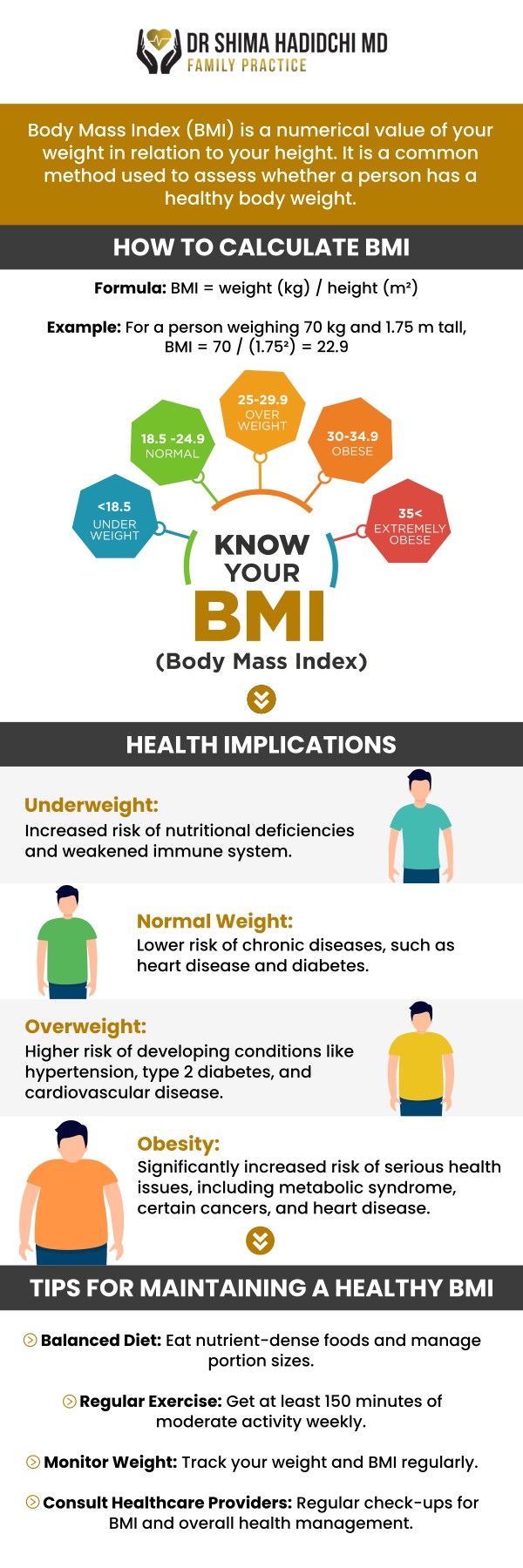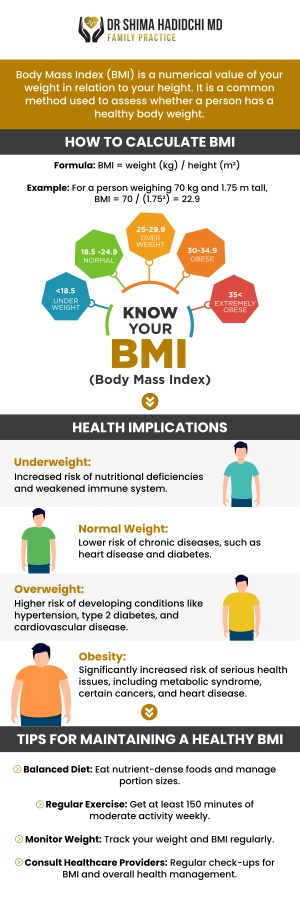What You Should Know About Body Mass Index (BMI)?
Body mass index (BMI) is a medical screening tool that measures the ratio of your height to your weight to estimate the amount of body fat you have. Dr. Shima Hadidchi MD uses Body Mass Index (BMI) to help gauge your weight and overall health. This simple calculation can provide insight into potential health risks. For more information, please contact us today or book an appointment online now! We have convenient locations in Apple Valley, CA and Victorville, CA.


Table of Contents:
How do I calculate my BMI?
What is a healthy BMI?
How should I know my BMI?
What insights does BMI offer about your body?
Why is it beneficial to be aware of your BMI?
BMI stands for body mass index, a measurement used by medical professionals to assess if your weight is reasonable in proportion to your height. It helps identify whether you are underweight, overweight, or within a normal weight range, providing useful insight into potential health risks. To calculate your BMI, you will need two key measurements: your weight and your height. BMI is calculated through a few simple steps:
• Measure your weight: Weigh yourself on a standard scale. For accuracy, it’s best to weigh yourself in the morning, wearing minimal clothing and no shoes.
• Measure your height: Use a measuring tape or wall-mounted stadiometer to accurately record your height. Stand straight without shoes, with your back against the wall for precision.
• Apply the BMI formula: The BMI formula is simple – start by dividing your weight in pounds by your height in inches squared, and then multiply that value by 703 (BMI = [lbs/in²] × 703).
BMI is widely used to classify weight categories, but it is more than just a number. This measure provides insight into your general health and potential risks associated with your weight.
For most adults, having a BMI in the range of 18.5 to 24.9 is considered within the healthy spectrum. Falling within this range suggests that your weight is in a good balance with your height, reducing the risk of weight-related health conditions. However, if your BMI is outside of this range, it could signal potential health concerns:
• Underweight (BMI less than 18.5): This might indicate malnutrition or other health issues that can weaken your immune system or lead to muscle loss.
• Overweight (BMI 25 to 29.9): Carrying extra weight can elevate the risk of developing chronic diseases like hypertension, sleep apnea, heart problems, and type 2 diabetes.
• Obese (BMI 30 or higher): Obesity is associated with an even greater risk of health problems such as cardiovascular disease, certain cancers, and joint disorders.
While BMI is useful, it doesn’t consider key factors like bone density, muscle mass, or fat distribution. For example, athletes with more muscle may have a higher BMI without being overweight or unhealthy. Similarly, people with low muscle mass may have a “normal” BMI but still carry unhealthy levels of body fat.
While there are ways to calculate your BMI on your own, the most reliable method is to consult a healthcare professional. Dr. Hadidchi provides a comprehensive assessment to accurately determine your BMI and interpret what it means for your health. By visiting her office, you’ll receive a thorough evaluation that considers not just your weight and height, but also other key factors like muscle mass, bone density, and overall body composition.
Dr. Hadidchi will use your BMI as part of a broader health assessment to understand your unique needs and guide you toward a healthier lifestyle. Rather than relying solely on a number, her approach ensures a more accurate and personalized understanding of your overall well-being.
BMI offers a simple way to assess your weight relative to your height, but it doesn’t tell the whole story about your health. While a higher BMI can indicate higher body fat, it doesn’t distinguish between fat and muscle.
Though BMI has some limitations, it remains a useful measure for gauging the risk of weight-related health problems. A BMI outside the normal range can indicate an increased likelihood of developing conditions like:
• Heart disease and stroke: Carrying excess weight can strain the heart, increasing the risk of cardiovascular problems.
• Type 2 diabetes: Obesity is a prominent risk factor for type 2 diabetes because too much body fat can interfere with normal sugar metabolism.
• Respiratory and sleep problems: Additional body fat can restrict breathing and raise the likelihood of experiencing sleep apnea.
Knowing your BMI provides several health-related benefits:
• Health Awareness: Your BMI serves as a simple and quick way to understand where your weight falls in relation to health standards. It gives you a snapshot of whether your weight might be putting your health at risk.
• Risk Indicator: BMI is often used to gauge your risk of developing weight-related conditions. A BMI within the overweight or obesity range indicates an elevated risk of chronic diseases.
• Goal Setting: Knowing your BMI allows you to set weight-related health goals. Whether you want to shed extra pounds or simply maintain a healthy BMI, having a baseline helps track your progress.
• Preventative Health: By regularly checking your BMI, you can catch potential health risks early and take action before they become more serious. Keeping your BMI in a healthy range can reduce your risk of developing chronic conditions.
• Improved Quality of Life: Staying within a healthy BMI range benefits your body and can enhance your vitality, self-confidence, and general sense of well-being.
Overall, while BMI is a useful tool for understanding weight-related health risks, it is important to approach it as one part of a broader health assessment. Combining BMI with other factors such as diet, physical activity, and medical history provides a more comprehensive picture of your overall health. For more information, please contact us today or book an appointment online now! We have convenient locations in Apple Valley, CA and Victorville, CA. We serve patients from Apple Valley CA, Victorville CA, Spring Valley Lake CA, Hesperia CA, Baldy Mesa CA, Mountain View Acres CA, Adelanto CA, and surrounding areas.

Check Out Our 5 Star Reviews


Additional Services You May Need
▸ Telemedicine
▸ Family Practice And Primary Care
▸ Walk-Ins
▸ Weight Loss Management
▸ Zepbound for Weight Loss
▸ Women’s Health
▸ Vaccinations & Immunizations
▸ Diabetes Management
▸ Geriatrics
▸ Pediatrics
▸ Internal Medicine
▸ Acne Treatment
▸ Cryotherapy Treatment
▸ Skin Lesion Removal
▸ Dementia Treatment
▸ Semaglutide GLP-1 Injections

Additional Services You May Need
- Telemedicine
- Family Practice And Primary Care
- Walk-Ins
- Weight Loss Management
- Zepbound for Weight Loss
- Women’s Health
- Vaccinations & Immunizations
- Diabetes Management
- Geriatrics
- Pediatrics
- Internal Medicine
- Acne Treatment
- Cryotherapy Treatment
- Skin Lesion Removal
- Dementia Treatment
- Semaglutide GLP-1 Injections








